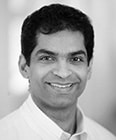
Head of Department, Institute for Indian Medicine, Essen-Mitte Clinics
Dr. Syal Kumar MD PhD, Naturopath. For more than 13 years he has been working as Head of Department, Institute of Indian Medicine - Ayurveda, at the Department of Complementary and Integrative Medicine, University of Duisburg-Essen, Essen-Mitte Clinics. Lecturer in Ayurveda training Integrative Medicine for physicians at the University of Duisburg-Essen. Dr. Kumar conducts research in Ayurvedic medicine at the Department of Complementary and Integrative Medicine, University of Duisburg-Essen and is active in many Indian-German inter-university exchange programs in research and teaching. He regularly publishes in medical journals and is a frequent speaker at natural medicine seminars and conferences. He is also secretary of the Ayurveda Physicians Association - Academic Professional Society of Indian Medicine (AFGIM) and a member of the German Organization for Naturopathy.
Syal Kumar comes from a traditional Ayurvedic family of doctors who have been practicing Ayurveda for 5 generations in Kerala, South India. He has been living in Germany for 17 years.
Fasting is becoming increasingly popular in many countries. The ancient Egyptian medical system, Hippocrates and also many monasteries in Germany have used the method of fasting. Various fasting practices are currently available as medical therapy. Germany has a long tradition of natural healing methods, which are already integrated into the treatment of many chronic diseases as working methods of integrative medicine. Hildegard von Bingen (1098-1179) was an expert in developing four therapeutic fasting cures. The book "Heilfasten" (1935) by the famous German physician Otto Buchinger was an authentic first publication book on medical fasting in Germany. Currently, many hospitals treat patients exclusively with the Buchinger concept. F.-X. Mayr therapy, whey cure, Schroth cure, mucus fasting, tea-water fasting, etc. are some of the other fasting methods. Recently, the method of interval fasting has become very popular.
The concept of fasting has been practiced in India for thousands of years as part of the religious and cultural aspect. In many families it is integrated as a routine program according to seasonal changes, festivals or during planetary influences. Mass fasting is performed in many temples in India as part of rituals and offerings.
Many of the traditional healing methods have developed their own fasting methods. Traditional Indian medicine - Ayurveda - is one of them. Here, fasting is applied therapeutically and individually according to the state of illness. Fasting according to the dosha concept plays a major role in Ayurveda. It serves to regulate the digestive, absorptive and assimilative functions in the body, which are thus controlled in a natural way.
The whole concept of fasting depends on the metabolic function (Agni) in the body. Ayurveda analyzes substances according to their quality, which further helps in analyzing the properties of food and human body functions.
The concept of metabolic toxins (Ama) is very essential in the treatment of many diseases today. IBS (Irritable Bowel Syndrome), ulcerative colitis, obesity, hypercholesterolemia, diabetes, rheumatoid arthritis, fibromyalgia, edema, migraine, chronic fatigue syndrome, burn-out syndrome, various skin diseases, psychiatric and psychosomatic diseases are some of the many diseases that may appear due to weakness of digestive and tissue metabolism. The disturbed doshas in the body, especially in the stomach, reduce the intensity or impair digestive activity, cause digestive disorders and produce metabolic toxins. Together they block the channels in the body that lead to various diseases.
Ayurveda includes six basic treatment principles, called Shat Upakrama. Among the above-mentioned methods, voiding therapy (Langhana) is the first. The term Langhana is derived from the Sanskrit word Laghu, which means "light". There are ten methods of Langhana therapy and one of them is fasting (Upavasa). Fasting here is the absence of food in the intestines or the control of food intake and facilitates the digestion of metabolic toxins, the activation of digestive enzymes and tissue metabolism, and removes blockages from the channels. In addition, fasting supports adaptation to physical changes during seasonal fluctuations.
Many of the chronic diseases of the West occur due to abnormal metabolic activity, which is also evident in the daily treatment of patients. Studies are also underway to confirm the involvement of metabolic disorders in neurological diseases as well.
2024 © Rosenberg Ayurveda Academy gGmbH